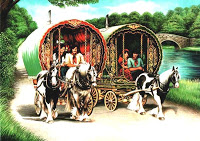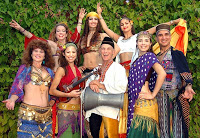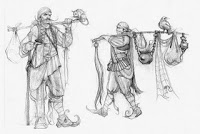Like the Suel, the Baklunish, or the Flan, the Rhennee are a race of humans that inhabits the Flanaess, specifically being found the lands touching on that great central body of water known as the Nyr Dyv. The Rhennee are perpetual wanderers, traveling the waters of the Lake of Unknown Depths and the waterways that connect to it in large barges, hence their nickname, the Bargefolk or Lakefolk. Among themselves, they call themselves the True Folk.
Appearance
Male Rhennee are compact, swarthy and usually sport dark curly hair and long mustachios. The women are often lithe, similarly olive skinned, and have shimmering raven-hued hair. The eyes of the Bargefolk are invariably dark brown, and they tend to dress in gaudy stripes and bold primary colors.
Background
According to their own folklore, the Rhennee originally hailed from an entirely different world than Oerth, traveling here through some magical means not fully understood. They thus think of themselves as the ultimate outsiders, forming a community-within-a-community wherever they happen to have come ashore at a given moment.
The Rhennee are formed into clans, with each led by a powerful Lord, consisting of an extended family. Some clans are large enough to require a small fleet of barges, while others get by on just a single boat. Clans engage in feuds, alliances, weddings, feasts, and the like at a dizzying pace. Within the space of a single season, two clans may be engaged in a blood feud, celebrate the wedding of two of their young members, and then form alliances with sworn enemies of each other. Few can fathom the full swirl of the relationships between the many Rhennee clans, and most find it simpler to simply take things as they come at the moment. Only Lords are allowed to have more than one woman at a time.
The Rhennee are a folk fond of dance and drink, and will find excuses for celebrations in events small and large. The meeting of two clans in the same cove, for example, can be an occasion to slaughter a pig and dance (and drink) the night away.
Outsiders are sometimes welcomed into a clan as an honorary member. This is sometimes done with those who have fought side-by-side with the Rhennee in a life or death situation, saving a boat, etc. Once this happens, that individual is held to the same code as the rest of the Rhennee, and ignorance is no excuse for transgression.
The Rhennee have their own faith which they do not share with outsiders. There are no Rhennee clerics, save for those very rare few who convert to the faith of some non-Rhennee God. Since doing so involves the total renunciation of the Rhennee life, it is almost never done.
Due to the closed nature of Rhennee society, they almost never leave their clan to take on the career of an adventurer (indeed, most would say they already lead such lives, without having to go looking for monsters to slay). For this reason, having Rhennee player characters is not encouraged.
Honor, Duels, etc.
Honor is highly prized among the Bargefolk, and slights, real or imagined, are one of two ways; either through the payment of wergild, or thorough duels known as the “test of the blades”.
The payment of wergild to resolve slights is an old tradition not limited to the Rhennee. The prices involved can range from as little as 25 silver coins for cuckolding a man (although he could choose a duel instead; see below), 50 silver coins for the slaying of a woman (paid to her kin), 500 for the killing of a man (again, paid to his kin), up to 10,000 for the slaying of the lord of a clan. If such wergild is not offered in recompense for offenses, a feud between the clans will erupt until the matter is settled.
For other affairs of honor (flirting with the woman of another man), the offended party might challenge the other to “the test of the blades”, in which the two combatants are bound together at the wrist and fight close-in with whatever blades they happen to have on them at the time the challenge is made (most Lakefolk carry daggers on them at all times). Such duels, while technically to the death, are rarely fatal, however; if one or the other combatant cuts the thong connecting them, he is automatically the loser and must pay 12 silver coins or be outcast, in addition to the established wergild. Either way, the loser will usually simmer with resentment for years afterwards. The winner of the test gets the woman in question, naturally; to refuse her is to commit the worst sort of offense against the Rhennee code, and the offender will be outcast and his clan shunned as honorless curs.
A similar tradition exists for the Rhennee women. If one is caught flirting with the man of another, they will engage in a similar duel, minus the blades; fighting is limited to punching, kicking, and wrestling.
Both sorts of duels are seen as an opportunity for the observers and bystanders to engage in spirited wagering on the outcome, often far in excess of the value of money that could conceivably change hands in the duel itself.
Born Thieves
The Rhennee have a weal-earned reputation as petty thieves, and villages will often lock up their livestock when a Rhennee clan barge comes calling. All Rhennee over the age of 10 have a chance to pick pockets equal to a 1st level thief, and those who are thieves or sub-classes of thieves gain a 5% bonus to their earned experience points.
The Bargefolk have their own secret language of hand signals and verbal cues, similar to Thieves’ Cant, by which they can identify friends, warn one another of the presence of the city watch, prime marks, etc. It is not generally taught to outsiders, but some in the underclasses of the lands frequented by the lakefolk have been known to learn it.
Boats
The boats, or barges, by which the Rhennee ply the waters in and around the Nyr Dyv are distinctive. Their draught is extremely shallow; less than a fathom (six feet or so), meaning the Rhennee barges can travel up rivers and tributaries completely impassable to other, larger, vessels.
The barges themselves vary in size, with more powerful clans having more impressive boats. An average sized barge might be 15’ x 40’, with small examples being 10’ x 30’, and the largest perhaps 30’ x 90’ in length. They have no cabins save that on the aft deck reserved for the Lord of the clan, but their hulls are planked over, affording a closed space for cargo. They have both sails and oars (the latter for use when the winds are either not favorable or non-existent), and they are equipped with clever arrangements of buckets and pulleys for emptying the bilge when heavy seas demand it. They also keep a small boat in trail for quick journeys.
The ships are heavily armed as a rule, not only to deter pirates (river pirates are thick in some areas frequented by the Bargefolk) but also to fight off the fearsome sea monsters that are found in the Nyr Dyv. Crossbows, scorpions (very large bolt-throwers mounted on swivels), and oil are primary weapons against such creatures, as well as javelins and regular bows.
The Rhennee themselves are, as might be expected, expert fresh-water sailors, having been born and raised on the water. They will always return to the Nyr Dyv to winter over, and the Bargefolk have a number of secret coves and other places along the shores where they congregate to wait out the stormy season.
Rhennee magic
Many Rhennee, especially the women, are thought to possess innate magical powers. The truth, as is so often the case with the Rhennee, is somewhat ambiguous. Rhennee women do, indeed, have certain powers that could be called magical. More, however, use powers of sleight of hand and obfuscation to create the illusion that they are much more powerful in such regards than they actually are.
All Rhennee women are able to use crystal balls, regardless of class. (Whether or not the crystal balls many of them seem to have are genuine or not is another story.)
Among the elder women of the clans is the vetha (pl. “vethoi”), or “wise woman”. These vethoi are well respected within the Rhennee society, and a clan with a vetha aboard their barge gains greatly in prestige. Vethoi are not exactly a class unto themselves, but they are gifted herbalists and do possess the following spell powers (including their reverse, if applicable):
- Augury (once per day)
- Predict Weather (once per day)
- Divination (once per week)
- Remove Curse (once per month)
The Attloi
 The Attloi are cousins of the Rhennee who make their way entirely on land, in caravans of brightly-painted wagons. Where their lake-dwelling cousins are noted for their prowess with seamanship, the Attloi are noted as excellent dealers of horse-flesh, and make their way as tinkers, traders, and entertainers. Kidnapping is an art not unknown amongst the Attloi, nor is thievery, but rarely practiced on their more well-traveled routes. They are otherwise the same.
The Attloi are cousins of the Rhennee who make their way entirely on land, in caravans of brightly-painted wagons. Where their lake-dwelling cousins are noted for their prowess with seamanship, the Attloi are noted as excellent dealers of horse-flesh, and make their way as tinkers, traders, and entertainers. Kidnapping is an art not unknown amongst the Attloi, nor is thievery, but rarely practiced on their more well-traveled routes. They are otherwise the same.The Bargefolk look down upon the Attloi, barely acknowledging them as being of the True Folk. In times of crisis, however (such as the intermittent pogroms against them enacted by the two Urnst states), they will join together in common cause.












Is this where I get to point out that, as far as I'm aware, a Scorpion is actually a torsion-powered bolt thrower and not a large catapult? You might be referring to an Onager, by way of wheeled catapult, or I could be missing something entirely important.
Mind you, it was still a very interesting read. Thanks for sharing! Every time I read something more I start pining for making of random and hilarious characters.
I actually knew that…
5 x.p. for the first person to identify that third picture. 🙂
Great stuff! I've always loved using these folks in Greyhawk games, and they were the inspiration for a lot of the halfling culture in my current game. Very nice expansion of the old GH material.
Is the third picture from From Russia With Love, perchance?
Got it in one!
Refer to "The Way of the Lake," in Living Greyhawk Journal Issue #2.
Read it thoroughly, Lance. Unfortunately, it's a product of its times, and I don't do 3.x.
That said, I did use a few things from there, such as the Vetha (and a lot from Saga of Old City).